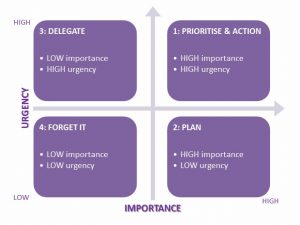Today I’m having a meeting to discuss Time Management issues so I felt this was as good a time as any (if you’ll pardon the pun) to put something on the site about how I manage my time.
Predictably a person who is focused can achieve 80% of results with a mere 20% of effort. Following these tips below will help focus your efforts and achieve more promising results.
Firstly, I start by quickly writing a “To Do” list. I think about how urgent and importance these tasks are and categorise according into the table below (adapted from The Seven Habits of Highly Effective People, Stephen Covey). The urgency of a task is determined by when it should be done and the importance is determined by its contribution/impact on longer terms goals.
 Box 1 will contain my most urgent and important tasks e.g. dealing with emergencies, demands from clients, planned activities, meetings, resolving problems, etc. Typically these tasks need immediate action and I prioritise everything in this box according to its urgency. The ideal situation is that there are very few tasks in this box because, think about it, we all want to make life easier for ourselves so through careful planning we should be able to minimise the time spent here.
Box 1 will contain my most urgent and important tasks e.g. dealing with emergencies, demands from clients, planned activities, meetings, resolving problems, etc. Typically these tasks need immediate action and I prioritise everything in this box according to its urgency. The ideal situation is that there are very few tasks in this box because, think about it, we all want to make life easier for ourselves so through careful planning we should be able to minimise the time spent here.
Box 2 is the most important section and how I approach these tasks will be critical to my success. Tasks in this category typically include; planning, researching, networking, preparing proposals/presentations. The key here is again urgency, because the tasks are not so urgent they can be planned but DON’T let the lack of urgency encourage you to delay these tasks. I make sure I dedicate a slot in my diary to tackle them to make sure they happen. I make sure I allow enough time to complete the task and through experience have found that it’s usually best to add a little extra time as you’ll probably underestimate. When planning the tasks I think about which days (or times of the day) I’m more productive so I can really use that time to the maximum.
“The key is in not spending time, but in investing it.” Stephen R. Covey
Effort spent in Box 3 is of little value so I try to avoid these tasks if at all possible. Tasks in this category typically include double checking previous work, interruptions, clarifying previous information. If you’re lucky you will have someone to delegate some of these tasks to. If not, you really need to question whether they need attention at this point and discard if at all possible.
All other tasks (Box 4) are noise and only encourage procrastination, e.g. surfing the internet, unnecessary meetings where I’ve no real contribution to make, social media (apart from the necessary management of my accounts), unnecessary filing/tidying, daydreaming, etc. I tend to review the value of doing unimportant and low urgency tasks because it’s unlikely I’ll get any positive outcome from them; it’s not motivational and should be avoided at all costs. If this applies to you you’ll need to think about why you do some of these things e.g. sometimes stress about something can cause your mind to wander. It’s actually possible to convert this unproductive time into productive time e.g. driving to appointments can be unproductive time however I try to listen to audio books to make the most of the journey. I know that if I’m constantly spending time on Box 4 tasks then I lack motivation. Last time this happened all I really did was re-organise my desk space because you know what they say “a change is as good as a rest”, and it worked for me.
If you follow these steps you’ll soon notice an increase in productivity but one thing to watch out for is that tasks can switch from one box to another fairly quickly depending upon other factors (in particular deadlines creeping up can push tasks from non-urgent to urgent overnight), so you will need to review your task list on a regular basis. I spent 10 minutes at either the end of each day to re-evaluate my list will keep myself on track.
Good Luck.


